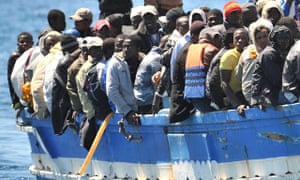by YOHANNES WOLDEMARIAM
 About 42,000 people have attempted to cross the Mediterranean to Italy so far this year, according to the EU border agency, Frontex. PHOTO/Ettore Ferrari/EPA/The Guardian
About 42,000 people have attempted to cross the Mediterranean to Italy so far this year, according to the EU border agency, Frontex. PHOTO/Ettore Ferrari/EPA/The Guardian
Asylum quests have become toxic issues in just about every affluent country. Even saving lives along the Mediterranean worries some as a lure that will encourage and facilitate more migrant arrivals.
An empathetic story in the NY Times by Suzanne Daley titled “Refugee Crisis on the Beach in Greece” drew a mere 10 comments as compared to 173 comments reacting to Ross Douthat’s opinion piece. Douthat’s sensationalized framing of the issue as “Africa’s Scramble for Europe” only serves to induce fear of refugees. It really is farfetched to draw parallels between the European scramble for Africa and the current desperate effort by poor Africans fleeing to the shores of Europe. Most refugees arriving in Europe, far from scrambling for European resources as Europeans did in conquering Africa will, if successful, be engaged in hard work most Europeans would not want to do such as cleaning toilets, performing arduous farm labor, the service industry and taking care of the elderly. What is more, in reality only a small fraction of asylum seekers is knocking on the gates of Europe with 86% languishing in camps in poor neighboring states.
Kenneth Roth, executive director of Human Rights Watch during an interview with Amy Goodman on Democracy Now said: “And yes, 310,000, 320,000 people [in Europe] are a lot of people. But Europe’s population as a whole is about 500 million. So what we’re talking about, the number of people who have come this year is less than 0.1 percent of Europe’s population.” So, is this a real crisis or a fabricated one because the asylum seekers are of a darker complexion?
An Op-Ed article by Goodwell Nzou, a Zimbabwean PhD student titled “In Zimbabwe, We Don’t Cry for Lions” evoked 1,257 passionate comments about the late Cecil, the lion. Nzou quipped “we Zimbabweans are left shaking our heads, wondering why Americans care more about African animals than about African people.”
Personally, I grieve for lions, elephants, rhinos and all the wonderful endangered animals in Africa just as I do for the humans drowning in the Mediterranean. I, however, do understand where Nzou is coming from. Reading through the comments in the NY Times about asylum seekers, I am distressed by the bigotry and total lack of understanding for the plight of refugees. Cecil galvanized a global movement and empathy. In contrast, refugees seem to elicit contempt! It is a paradox to witness a pairing of love for animals with disdain for humans as if the two are mutually exclusive.
The responses are mostly intended to perpetuate a “Fortress Europe” mentality, ranging from threatening military action against traffickers, outsourcing of asylum seekers to poorer countries in exchange for money, to building walls and fences, surveillance, border protection, indifference to life saving measures in the Mediterranean by scraping the Italian rescue operation Mare Nostrum, and warehousing refugees in detention centers.
What is yet to enter the public discourse is Western complicity for the circumstances that generate refugees. The contributions of the U.S.-British “Mission Accomplished” in Iraq and the U.S.-British-French “Mission Accomplished” in Libya to the refugee exodus is rarely acknowledged. Moreover, there is little discussion regarding the obligations of European countries to their former colonial empires. Does Europe owe Africa anything for inflicting structural damage through exploitive practices, and the legacy of drawing arbitrary borders resulting in chronic conflicts and stolen riches? The typical Western response to this is that it is all “in the past”, and that this generation of Europeans cannot be held responsible. Get over it. Clearly, the West has failed to put structures in place for justice and is guilty of glossing over the events that shaped the reality of post-colonial states, further widening the gap between the developed and developing worlds.
Pambazuka News for more
